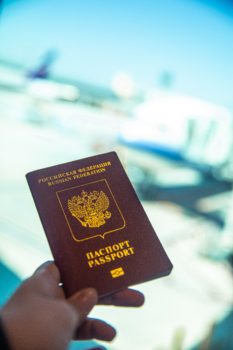News: US visas for Russian citizens Posted by bota on May 13, 2021 in Grammar, language, News, Politics, Vocabulary
Originally, I had a Радо́ница (Radonitsa) blog for today and if I had to write about visas, this is the type of embassy-themed blog I would rather be writing right now, but alas.
Russia and US relations like to frequent major headlines and while it’s not a surprise that the two got caught in the spotlight again, the latest news seems to have caused a lot of panic, and rightfully so.
Articles like this one “U.S. Suspends Visa Services at Consulate in Russia: Ambassador” started flooding social media and news channels in both English and Russian.
From what I understand, the US embassies in Russia will stop issuing all nonimmigrant visas to Russian citizens with the exception of a few diplomatic kind. The US justifies this as a direct response to Russia’s promise to publish a list of “unfriendly countries” (спи́сок недру́жественных стра́н). The list (supposedly) has the United States in the first place.
You might be asking yourself “What in the world is a ‘list of unfriendly countries?” First of all, welcome to the club. Second of all, according to this article, the list will first and foremost serve as a basis for any potential са́нкции (sanctions) as well as prohibit embassies and consulates of these ‘unfriendly countries’ to hire Russian citizens. The US wasn’t the only one that expressed its discontent about the issue. The yet unpublished list has also received backlash from the EU.
What now?
As someone who has dealt with and relied on all my travel to and living in the US (as a Kazakhstani citizen, but nonetheless) through nonimmigrant visas, it’s absolutely terrifying to even imagine hearing that your plans are hanging upside down and completely enveloped by uncertainty.
What happens to the Russian students who either just enrolled in an American university of their dreams or should hear back from the admissions office this summer? What of the families relying on tourist visas to see their loved ones living in the US? It seems as if the global pandemic and subsequent travel restrictions weren’t enough of an obstacle and now this.
All in all, the situation leaves a lot of questions for those seeking неиммиграцио́нные ви́зы (nonimmigrant visas). And I’ll remind you that earlier this year the US closed two of its consulates in Russia: one in Vladivostok and another in Yekaterinburg.
The most recent news sprung a response from a number of commercial visa-processing agencies that are offering alternative routes for students applying for visas this year. They are saying Russian citizens can apply through embassies in Israel, Poland, and the UK.
But let’s go back to the Russian words for “unfriendly” for a second.
«Недру́жественный»
Aside from wanting to understand how this top-level political decision affects regular people, I kept rereading the name “спи́сок недру́жественных стра́н” and its subsequent translation in the Western media as “the list of unfriendly countries”.
I actually read the headlines in English first, so when trying to translate the word “unfriendly” in my head I immediately went to the Russian word “недружелю́бный”.
So, what exactly is the difference between “недружелю́бный” и “недру́жественный”?
The short answer is ‘недру́жественный’ is more formal than ‘недружелю́бный’.
According to Wiktionary, недружелю́бный comes from дружелю́бный and means “неприязненно настро́енный, недоброжела́тельно, вражде́бно относя́щийся к кому-либо” (someone who is unfavorable and inhospitable towards someone).
Недру́жественный (from дру́жественный) means “отлича́ющийся недоброжела́тельным, неприязненным отноше́нием (обычно к друго́му госуда́рству)” [Translation: characterized by an inhospitable and unfavorable attitude, usually towards another country].
Also, you might have heard the latter one in a phrase “дру́жественный ого́нь” (a friendly fire).
So, it now at least makes linguistic sense why the Russian list refers to the countries as “недру́жественные”.

Build vocabulary, practice pronunciation, and more with Transparent Language Online. Available anytime, anywhere, on any device.






